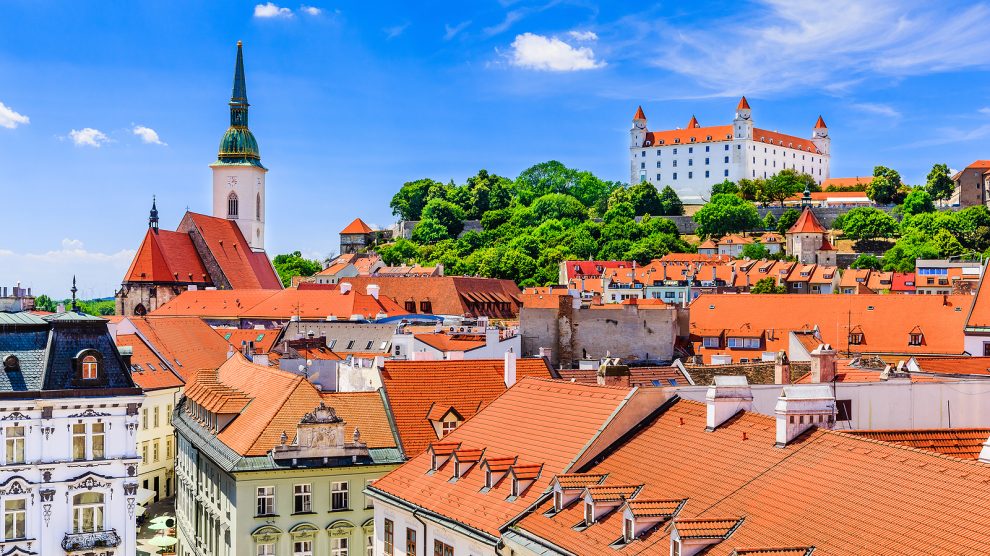In the sixth and final article in a series discussing an important weekend of elections for the emerging Europe region, Adam Hsakou looks at Slovakia, where more than half of voters cast their ballots in favour of eurosceptics.
This year’s European elections in Slovakia were followed with perhaps more interest than would normally be expected given the attempted assassination of Prime Minister Robert Fico in May, when the leader of the populist Smer party was shot by Juraj Cintula, a 71-year-old man who opposed his agenda.
Although Fico survived, the event profoundly shocked public opinion, exacerbating the nation’s trauma since the 2018 murder of journalist Ján Kuciak, who was investigating government corruption. Back then, the executive branch was already held by Fico, forcing him to resign, before coming back to the forefront of national politics as prime minister in October 2023.
Following the attack on Fico, all of Slovakia’s 130 MPs voted a landmark resolution, urging all political parties, civic organisations, and media to respect election results and refrain from spreading hatred against the democratically elected government.
This context heavily influenced the Slovakian European campaign, resulting in a 34.38 per cent turnout—the highest ever of Slovakia’s five European elections since 2004. Although still one of the lowest participations at EU level, it is an optimistic development for a country facing its third election in a few months (legislative in October 2023, presidential in March 2024) and traditionally exhibiting low participation in European elections (around 20 per cent or below).
Progressive success
If the perceived remoteness of the EU is a common sentiment across Europe, it is particularly pronounced in Slovakia, which sends only 15 MEPs to the European Parliament. But for the first time in a decade, political parties took this election seriously, fielding strong candidates and mobilising the electorate.
Despite not being a total surprise, the first place of the social democrats from Progresívne Slovensko (PS), who garner 27.81 per cent of the vote, is remarkable. They will send six MEPs to the European Parliament, and will sit with the centrist group Renew. Above all, PS managed to outperform the populist left-wing Smer, which came second with 24.76 per cent.
The success of the Progressives, led by Ľudovít Ódor, is attributed to the mobilisation of an electorate committed to anchoring Slovakia within the EU, contrasted with Smer’s anti-Ukraine stance, often compared to Viktor Orban’s, which diverges from the Western mainstream. PS also managed to absorb votes from smaller parties such as SaS (4,92 per cent) and Demokraci (4.68 per cent) who failed to enter the European Parliament given the five per cent threshold.
The biggest challenge in the long term for PS will be to appear nationally as an alternative to the ruling Smer. To do so won’t be an easy task. While it has already enlarged its base, it must maintain ideological consistency (between socialists and centrists) while finding political allies. Yet, it has rather limited reserves, and its most plausible partner seems to be the party KDH, a member of the European People’s party (EPP), gathering Christian-democrats (7.1 per cent; one seat).
Although finishing second is not easy politically nor symbolically, Smer actually managed to improve its result compared to 2019 (three extra seats and a total of five MEPs).
This is due to the strong candidacy of Monika Beňová, an MEP since 2004, coupled to the disappointing score of Hlas (7.2 per cent, one seat). This junior party, a member of the governing coalition alongside Fico, was expected to secure two seats, but suffered from putting at the forefront of its campaign a less recognisable candidate, Branislav Becík, known for questioning anti-pandemic measures during the Covid-19 crisis. Part of Hlas’ volatile electorate preferred to stay home or vote Smer.
Following the results, Beňová announced that her MEPs, “will be an extended arm of Robert Fico’s government”—a rather gloomy perspective for Brussels. On top of disapproving of Ursula von der Leyen, Smer is willing to stop EU support for Ukraine, amend the Green Deal, and to protect its veto at the EU Council in order to have leverage at state-level, most likely to defend some its reforms that may harm the rule of law in the country.
A divided society
Another notorious feature of the elections is the third position of Republika, which took 12.53 per cent of the vote. This far-right party, led by Milan Uhrík, deployed a particularly effective communication strategy on social media, allowing it to secure two seats in the next European Parliament.
Consequently, despite the seemingly triumphant outcome for PS, a more intricate reality lurks beneath the surface: over 50 per cent of the electorate cast their votes in favour of eurosceptic factions.
As of now, half of the newly elected Slovakian MEPs are not affiliated to any European party. Therefore, it will be interesting to follow which European factions MEPs from Smer, Republika, and Hlas will join in order to influence European politics.
Republika is expected to sit with the European Conservatives and Reformists (ECR) or Identity and Democracy (ID). The move from Smer and Hlas in this new constituency may be similar, though uncertain, as they could well remain independent. These two parties used to sit with the European socialists, before being suspended in October 2023 given their anti-Ukrainian stance.
While negotiations could begin as early as this summer, the European elections in Slovakia will have cemented one undeniable truth: the profound divisions that characterise its society.
Unlike many news and information platforms, Emerging Europe is free to read, and always will be. There is no paywall here. We are independent, not affiliated with nor representing any political party or business organisation. We want the very best for emerging Europe, nothing more, nothing less. Your support will help us continue to spread the word about this amazing region.
You can contribute here. Thank you.


